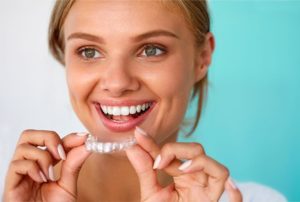
Invisalign is one of the hottest dental treatments around; the clear aligners have helped countless patients with straightening their smiles and enhancing their livelihood! However, if you’re curious about hopping on the Invisalign bandwagon, you might have concerns about whether the treatment is suitable for you. One thing that might be raising doubts in your mind is bruxism, or teeth grinding. Keep reading to learn a little more about Invisalign and how it can still be a viable option for patients with bruxism.
How Invisalign Works
Invisalign employs a series of clear aligners to move a patient’s teeth into a proper position over time. Each successive set of aligners moves a person’s teeth ever closer to where they should be. As long as patients comply with the 22-hour rule and take great care of their aligners, the Invisalign process is generally quicker, more convenient, and much more comfortable than wearing traditional braces.
Invisalign and Teeth Grinding
Invisalign clear aligners are made from a special, flexible plastic material; and if you’ve ever held or seen an aligner up close, you probably noticed that it seemed somewhat tiny and potentially fragile. This might raise some doubts in your mind about whether or not they’re able to withstand the pressures of teeth grinding.
In short, most patients who grind their teeth are still able to undergo Invisalign treatment. However, if you have to wear an appliance like a night guard or splint due to bruxism, Invisalign might not be a good option for you; it’ll be up to your provider to decide.
If you’re worried that your teeth grinding will destroy your aligners during the treatment though, you shouldn’t panic. There is a chance it’ll wear your aligners down faster, but this isn’t a big deal at all; since patients are typically given a set of aligners to wear for 2 or so weeks, more than likely, the teeth grinding won’t severely impact your aligners before it’s time to swap to a new set. If necessary, your provider can simply order a replacement set for you. It’s also worth noting that Invisalign also serves as a protective barrier against potential damage caused to your teeth by bruxism.
Invisalign can do quite a lot for your smile—and better yet, the treatment is relatively streamlined and much more convenient than the traditional orthodontic route. That said, bruxism isn’t something you should be concerned about if you’re curious about Invisalign; it’s still likely a feasible solution for your smile!
About the Practice
The team at Gentle Dentistry Sparta is thrilled to serve patients and families in the Sparta, NJ area under the leadership of Dr. Zelia D. Cannon and Dr. James Shahinian. Their practice offers a wide range of services including Invisalign. If you have any questions about the article or you’d like to arrange a consultation to see if Invisalign can help you reach your smile goals, don’t hesitate to contact the practice online or by phone at (973) 729-9044.
